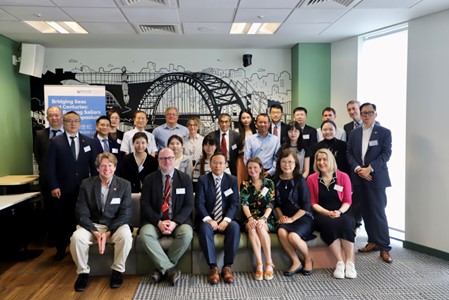Bridging seas and centuries: the Beiyang Sailors Legacy Symposium successfully held at Newcastle University
24 July 2025
Across Oceans and Centuries: The Legacy of the Beiyang Fleet Symposium
From July 21 to 22, 2025, the interdisciplinary symposium "Across Oceans and Centuries: The Legacy of the Beiyang Fleet" was held with great success at Newcastle University Business School. The event was hosted by the Business School, co-organised and sponsored by the Confucius Institute at Newcastle University, and supported by a range of partners, including the Confucius Institute at Newcastle University, Xiamen University, and the UK Beiyang Fleet Heritage Foundation. It also received strong support from the Chinese Consulate-General in Manchester, Newcastle City Council, North Standard, the North East Museums, Discovery Museum, and the China Foundation for Cultural Heritage Conservation.
At the opening ceremony, senior representatives from both China and the UK delivered speeches, including Mr. Tang Rui, Consul General of the People's Republic of China in Manchester, Ms. Jennifer Hartley MBE, Deputy Director of Investment and Development at Newcastle City Council, Professor Christopher Whitehead, Interim Pro-Vice-Chancellor for Global at Newcastle University and Board Chair for the Confucius Institute at Newcastle University, and Dr. Andrew Law, British Director of Confucius Institute at Newcastle University. All speakers highlighted the importance of the Beiyang Fleet legacy in understanding Sino-British historical connections, promoting cross-cultural understanding, and fostering cooperation in heritage preservation.
The keynote sessions featured several internationally renowned scholars including Professor Lu Jiande, Director of the Centre for Comparative Literature and Cross-cultural Studies at Xiamen University. Each speaker explored the multifaceted significance of the Beiyang Fleet’s heritage from perspectives such as cultural memory, archaeological practice, organisational studies, and tourism communication.
As a city shaped by its maritime and industrial past, Newcastle holds a special historical link with China’s naval modernisation in the late 19th century. Armstrong Shipyard in Newcastle was once a world-leading naval shipbuilding centre and played a crucial role in building advanced warships for the Qing government as part of China's modern coastal defence.
Newcastle is also one of the cities where the Beiyang Fleet’s legacy endures. After the First Sino-Japanese War in 1895, the Qing government continued its cooperation with Armstrong Shipyard, commissioning new vessels and sending Chinese sailors to train there. In 1911, Chinese naval officers en route to Newcastle also attended the coronation of King George V. During their stay, these Chinese sailors took the initiative to repair the gravestones of their fallen comrades at St. John’s Cemetery in Elswick, several of whom from Fujian Province. This gesture was regarded as the first known restoration project of a Beiyang Fleet cemetery and a powerful symbol of loyalty and unity among Chinese seamen abroad.
However, over the past century, these tombstones have suffered from weathering, with some collapsing or severely damaged. In 2016, a second restoration project—spearheaded by the China Foundation for Cultural Heritage Conservation and the Northern UK Chinese Entrepreneurs Association—was launched and completed in 2018, restoring dignity to these Chinese naval servicemen buried far from home. Today, the Newcastle Chinese community holds annual memorial ceremonies at Elswick Cemetery to honour their ancestors and share restoration experiences, academic findings, and visions for future development.
Of particular note is the discovery in 2024 of the tomb of the sixth Chinese sailor, Gan Zhaogong, which marked a new phase in the preservation of the Beiyang Fleet graves in Newcastle. This has drawn greater attention from scholars, heritage professionals, and local communities. The Beiyang gravesite has since become an important platform for Sino-British exchange, transnational remembrance, and cultural heritage practice.
On the second day of the symposium, a field study was organised by the UK Beiyang Fleet Heritage Foundation. Delegates visited the Beiyang naval cemetery to learn about its history and current status. They then toured the Discovery Museum, gaining deeper insight into Newcastle’s global role in industrial and maritime history.
The event was not only a high-level academic dialogue but also laid a solid foundation for future UK-China collaboration in heritage preservation, public education, and cultural exchange related to the Beiyang Fleet. Going forward, the host and partner institutions plan to advance a series of initiatives—including establishing a permanent memorial site, developing digital archives, co-curating exhibitions, and promoting educational outreach—to sustain cultural memory while generating measurable societal and policy impacts.
Both Newcastle University Business School and the Confucius Institute expressed their hope that this symposium will serve as a starting point for deepening long-term collaboration with Chinese universities, cultural institutions, and communities in jointly safeguarding this cultural legacy that transcends oceans and centuries.
